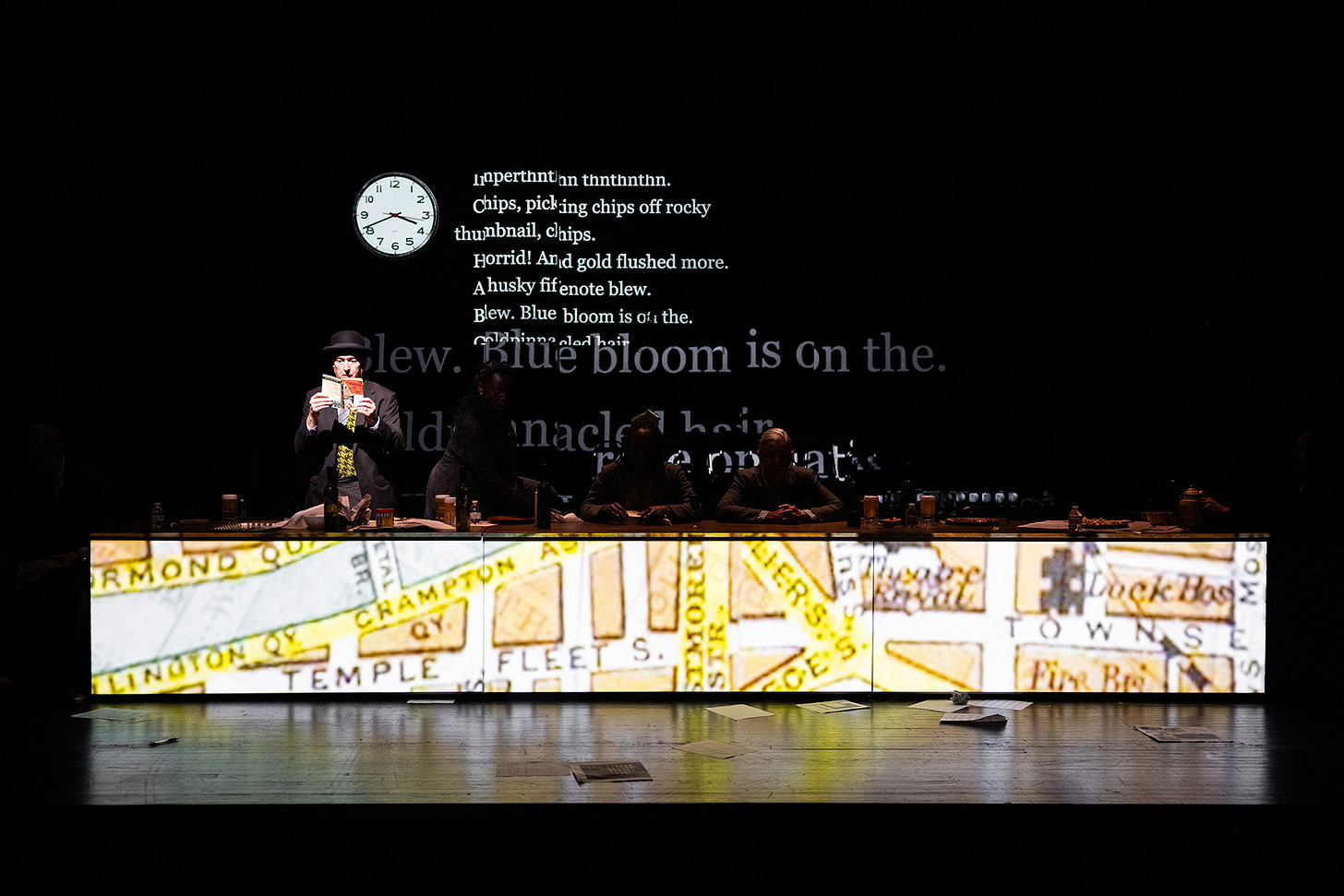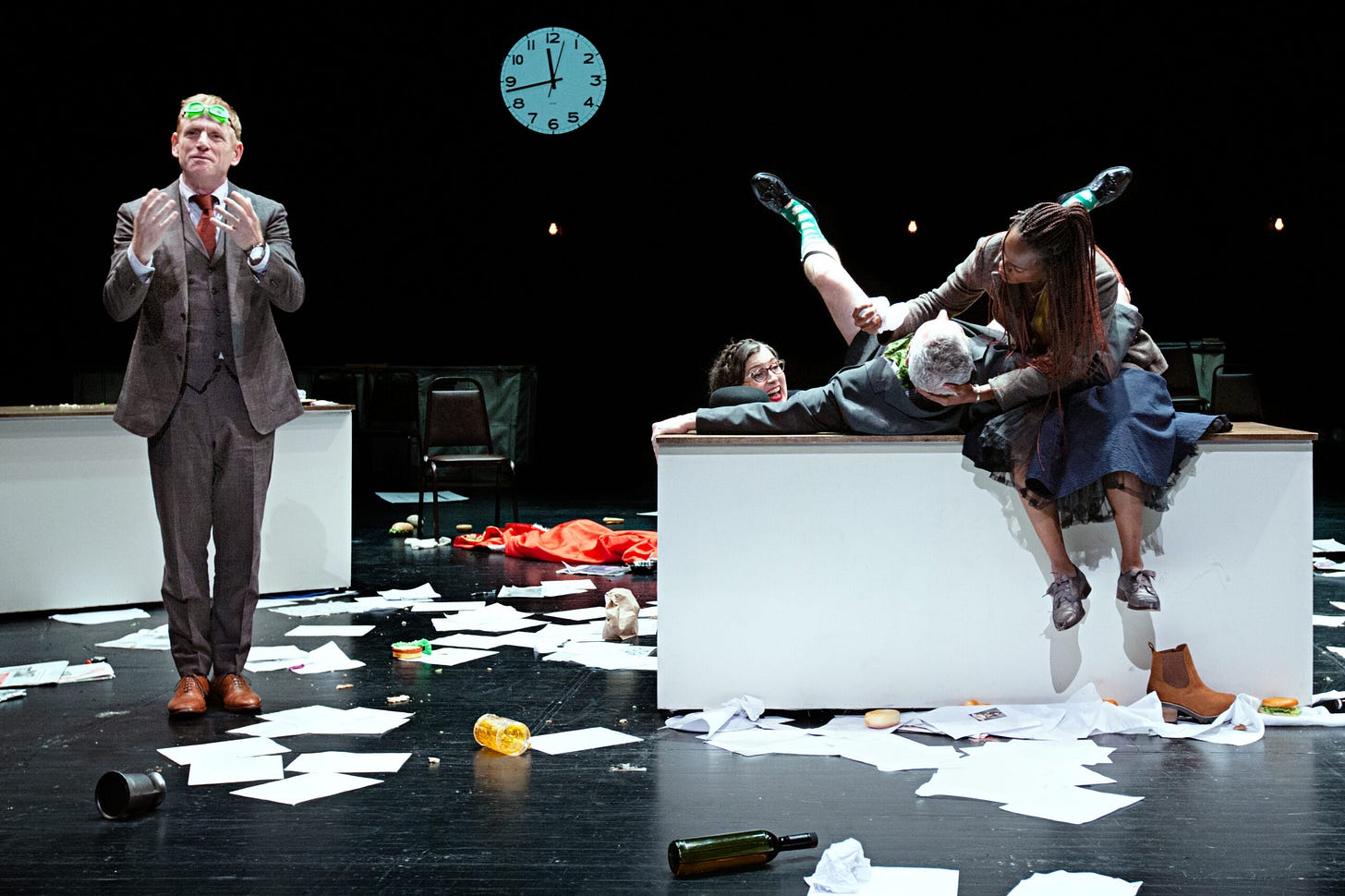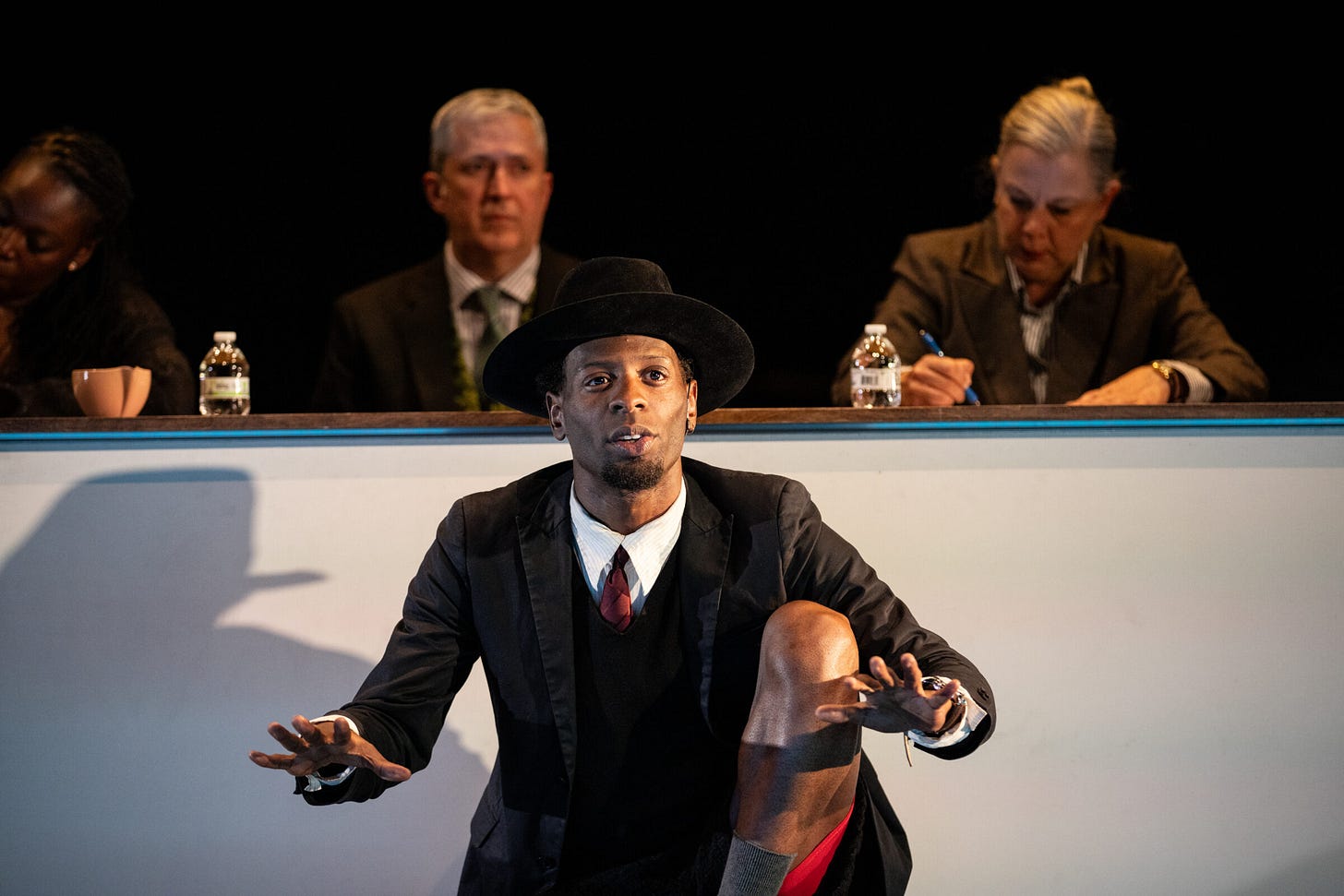Ulysses by Elevator Repair Service
A slog and a zany joy in one show. Is that what the book is like?
When I say FringeArts is in crisis, I mean things like: during their flagship event they admit people into the theater using a Bic pen to mark the back of your hand, and the house manager shouts, struggling to be heard over the hum of the crowd, “the second part is starting!” to the lobby—which isn’t so much a lobby but the antechamber of the theater and the restrooms—to signal that intermission is ending, and that there is no lobby because when they remodeled the bar they failed to take into account how the building actually functions as a performing arts space.
And then, before the intermission, you get an email that asks you how the show was. I am going to leave this here with one comment: I believe that audience surveys are a poor way to curate contemporary performance.
Ulysses
Created by Elevator Repair Service
Directed by John Collins
Co-Direction and Dramaturgy by Scott Shepherd
Text from Ulysses by James Joyce
Continuing tonight at 7pm, and as of this writing they’re somewhere in the matinee’s second act.
Recommended, highly if you love Joyce, maybe with reservations if you don’t.
Any play which relies on the inclusion of a synopsis in a program is at a serious handicap (that that program is digital, the fault of the house, is another issue—because you want your audience on their phones immediately before the start of the show). I haven’t read Ulysses, I tried once, years ago, loading it onto a Kindle which sits in a forgotten corner of my apartment. It’s probably still loaded on there, sitting at 1% read. I just couldn’t get into it at the time, and didn’t care much for Portrait of the Artist as a Young Man either when I read it a few years ago. I’m here because I love the theater, and I know ERS by reputation, and the direct page-to-stage adaptation they utilize here, literally going through the text word by word, has become their signature—and I love literature and literature on stage (not to brag but I just finished War and Peace, have you read this? Incredible stuff).
I think I came in at a disadvantage compared to those who know and love Joyce. For me, that marks a fundamental kind of incompleteness in a work—I think adaptations should stand on their own. An evening at the theater is not bonus content, it’s no online webisode tying into the mothership of this year’s action blockbuster. Which is to say: I kept getting lost as Bloom and company go about their day, complete with “he said” and “she saids” interjected between lines.
These interjections do something to keep the pace of the show moving quickly through the first act, pulling us along, an experience more like listening to fragments of an audiobook set to 1.25 speed than to reading a novel. This makes sense, as an answer to the wordiness of Joyce, which poses a particular challenge for anyone trying to stage it. The other answer is to fast forward, where, in a bit that quickly gets old but thankfully slowly shifts to the background, the actors accelerate their movements or perform a sort of fast-forwardedness, and projected text scrolls quickly by, always grounded by a projected clock on the upstage wall so we know what time it of Bloomsday it is. This is accompanied by a fast-forward sound, and since this is a book, I’m not sure what this sound is supposed to signify, with what seems like the occasional blips of speech but mostly like reel and tape spinning.
In the second act of the show, which is thankfully only about an hour, the fast-forwarding effect is largely toned down, and the whole play slows down, sometimes to a crawl, as it slips into the slower hours of the night and towards its conclusion. But by the time Joyce’s last stream of consciousness text is being performed as the long, meandering monologue that it is, I was well ready for things to accelerate again. I was grateful for the change from the first act’s rapid fire, which paid off most at its most zany, the stage being joyfully strewn with papers and scene title cards and lunch. But the seemingly decelerating pace of the second part strained my attention. Its final pacing shifts (which are rapidly approaching in the matinee as I write this) had me mentally prepared for the show to end about 10 or 15 minutes sooner than it did. I even found myself musing about whether or not such a long stream of consciousness monologue, clearly written for a different medium, was an affront to theater or not.
It didn’t help that I was also exhausted yesterday, and this is a show that demands you bring your attention to it. And I think the audience did. So, for me, mixed results from this hybrid of abridged and unabridged adaptation.
Scott Shepherd, Stephanie Weeks, Vin Knight, Maggie Hoffman—the entire ensemble is wonderful, everyone in picking up multiple characters. If there’s a logic to what actor picks up which characters, I didn’t pick up on it, but that’s okay and I would watch Scott Shephard read the dictionary. It was a personal joy to see Christopher-Rashee Stevenson, whose work I haven’t managed to see since we were in college together. The ensemble clearly built a lot of this show, down to a tin of Old Bay seasoning (Stevenson is from Maryland), and did so with love. The bits and stage business, the voice work, it’s all wonderful and at times very funny. There were a handful of times where I lost what was said between accents and a dense sound design.
The bits of pathos, the long monologue that ends the show, were less successful. I think it's largely a smartly designed show, but putting Stevenson in shorts and Knight in a skirt are odd choices (though Knight’s skirt has a rather significant pay off). Pulling a succession of props from the very plain tables that compose the biggest elements of the set was lots of fun, and increasingly impressive—what else is under there? Though I think those tables might overstay their welcome downstage in a straight-line. One thing to say about this scenic design (by dots, a collective) and staging is that the steep-rake of the FringeArts house doesn’t do it any favors, this is a theater that’s not very well designed for theater, and I felt through much of the show like I was looking down on the actors from my seat in the fifth row. I think that’s a real challenge for programming in that space, though ERS has performed in it before, and I hope it’s one that festival curators—should they ever be hired (I am available, btw)—think and talk about with artists.
I think the show would be markedly better if we were looking at the show instead of down on it, but so it goes. Such is life. Is the book, like the show, also both a slog and a zany joy? Such is life.
I’m not seeing anything today—I’m going to a concert!—and will return with reviews of what I’m seeing over the next few days, likely on Tuesday. Thanks for reading.







